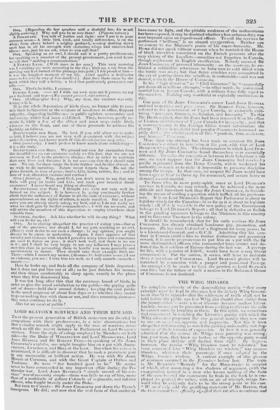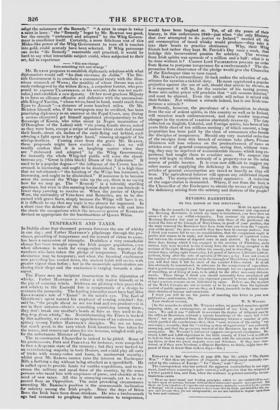TUE WHIG MIDASES.
held before the public eye lest Whig dirt should show dirtier from
the juxtaposition —were moat irksome beCallSO labour.
Luckily, no one can be pre% en tOd trout soeking to alleviate the evils he cannot cure. by laughing at them. In this saran. we sometimes To complain seriously of the demoralizing maxim " that every principle must he kept in abeyance lest the rickety Whig Govern- ment shotlil be injured—that the whiteness of truth shall not be 3011N RUSAELL and Sir ROBERT Speaking of Sir sIttns in their place deviate still further from right. Bc decrees, COLBORNE'S exploits, one might imagine him on a par with Alum- however, the maxim "Whig blunders must be tolerated,- has EROM BY, LYN EI/O1' n, and HILL :it the least. llot when his career is been converted into " Wh;g blunders are wisdom:' nay more— scrutinized, it is difficult to discover that he took a prominent part blunders, whatever their parent: „-se, if once ad< pted by the in any memorable or brilliant action. lie was with Sir Jolts Whigs, become w isdont. A curious example of this process 'Toulouse. at Comma, and with the Great Captain at Orthes and of unreason occurred in the Examiner before last. The topic So were " live hundred good as he." Ile seems is Mr. liexroa's "Remedy" for the Slave-trade: in support never to have commooded in any important affair during the Pe- of which, after mustering it few shadows of argument. (with the n!nsular war. Lord dolls RUSSELL'S " simple record of his ser- exaggeration natural in a man who knows nothing, Of the facts vices" was ofnecessity simple—there was little to say Of him, more of the ease beyond the statements he finds in the book he is em- than of a multitude of gallant Colonels of regiments, and inferior ployed to praise,) the writer, is ith an sir of triumph, brings for- officers, who fought bravely tinder the Duke. ward what be to idently ti els to be the strong point in his case. But tun to Canada : Sir Jowl Commons; put down the French " ll'e ,,,.a/ only add the gratifying statement of Mr. Buxton, that Insurgents. He did; and now that the real facts of that outbreak the Gorernment hare ()their:lip st.Vnified their intention to embrace and adopt the substance of' the Remedy." " A saint in crape is twice a saint in lawn : " the "Remedy" begot by Mr. BUXTON was good, but the remedy " embraced and adopted" by the Whig Govern-
ment is excellence itself. Certainly, a more felicitous test of this Midas-like power of the Whig Government to turn all it touches into gold, could scarcely have been selected. If Whig patronage can nuke "the Remedy" reasonable and practical, it. would be hard to say what intractable subject could, when subjected to their art, fail to experience
"this sea-change
Into something rich and strange "
Mr. BUXTON proposes to establish diplomatic relations with what diplomatists would call "les etats riverains du didiba." The Bri-
tish Government is to conclude a commercial treaty with the illus- trious monarch of Wawa; the stability of whose throne was seri- ously endangered by the widow Zulus, a corpulent huxter, who pro-
posed to espouse CLAPPERTON, or his servant, (she was not parti- cular,) and establish a new dynasty. Or her most gracious Majesty is to form an alliance offensive and defensive with the unconscion-
able King of Yarriba, "whose wives, hand in hand, would reach from
Eyeo to Janne!) "—a distance of some hundred miles. Or Mr. BUXTON himself, who, if the newspapers may be credited, has been
practising diplomacy as an amateur at the Papal Court, may (being
a serious character) get himself appointed plenipotentiary to the Sovereign of Kiama, who rides about (a Negro incarnation of
O'Donoghue of the Lakes) with " six young female slaves, naked as they were born, except a stripe of narrow white cloth tied round their heads, about six inches of the ends flying out behind, each carrying a light spear in her right hand," running alongside of his
stirrup-leathers. Coming even from the grave Mr. BUXTON,
these proposals might have excited a smile ; but we will readily confess that it is no laughing matter when they are " embraced and adopted" by the Whig Government, for instantly the whole Whig-led public will raise the simul-
taneous cry, "Great is (this black) Diana of the Ephesians." It
used to be a popular dogma—" the influence of the Crown has in- creased, is increasing, and ought to be diminished;' it is high time that we substituted—" the humbug of the ‘Vhigs has increased, is
increasing, and ought to be diminished." If nonsense is to become sense the moment the Whigs take up the cry, there is no saying how far we may go. The " Remedy " is a tolerably startling
specimen, but even in this seeming lowest depth we can forebode a lower deep yawning to receive us. When the justice of Opium Wars, the rationality of Veto-laws and Remedies, are to be dis-
cussed with grave faces, simply because the Whigs will have it so, it is difficult to say that any topic is too absurd for argument. In a short time the debates of the British Legislature will cast into the shade the occupations which the inventive genius of RAI1ELAIS devised as appropriate for the handmaidens of Queen Whim.



























 Previous page
Previous page